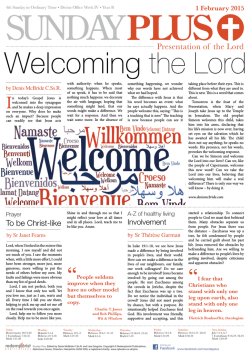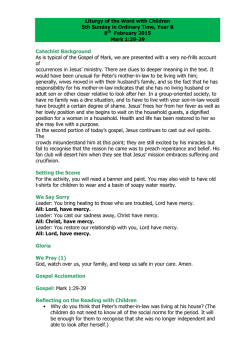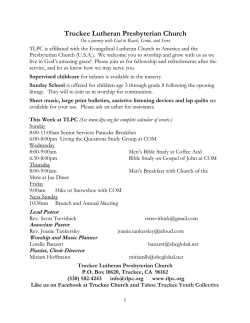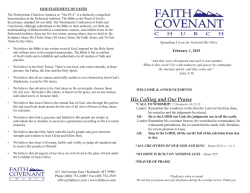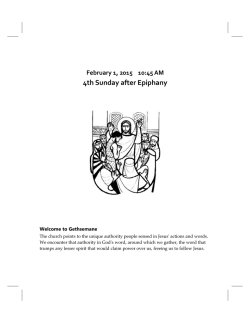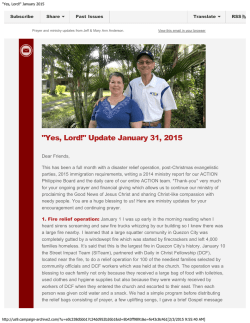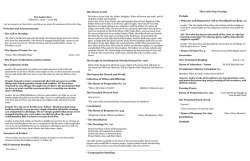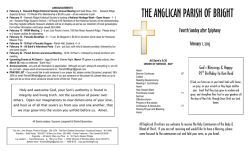
Sermon Notes
“The Blood of the Covenant” Mark 14:22-26 February 1, 2015 This morning we have the privilege of coming together around the Lord’s Table. And because we come often, we might be tempted to approach it routinely rather than holding it as precious. Well, today as we come to the place in our study of Mark where Jesus inaugurated the Lord’s Supper, we have the opportunity to reflect on this sacred privilege we have to eat and drink in the presence of the Lord, because the blood of Jesus establishes new covenant-relationship with God. [Mark 14:22-26] The first part of the Passover revolved around the cup of sanctification which represented the first part of God’s promise: “I will bring you out from under the burden of the Egyptians…” (Ex 6:5) During this part of the meal they would ceremonially wash their hands, and they would eat a vegetable (parsley) dipped in salt water to remind them of their tears in Egypt—remembering what God brought them out of, what God separated them from. The second part of the Passover revolved around the cup of instruction/plagues which represented the second aspect of God’s promise: “I will deliver you from this bondage.”(Ex 6:5) It was during this time that the story of the first Passover and the testimony of God’s mercy and judgment through the 10 plagues was retold, especially for the children to hear of God’s redemption. The Background: Passover We know from the context of Mark 14:12-21 that the disciples were not just eating any meal with Jesus—they were eating the Passover meal with Him. And it was during this Passover meal that Jesus spoke some remarkable words that would alter history. To grasp the significance of what the disciples heard that night, its helpful to understand that the Passover was more than just a meal—its involved a liturgy. The Passover commemorated how God brought the Israelites out of slavery in Egypt on the night when God commanded them to paint the blood of a lamb over their doorposts and eat unleavened bread so they could leave in haste after the angel of death Passed over the homes of the Israelites but took the firstborn of all the Egyptians. Year after year the Israelites were to have a special celebration to remember what God had done. The Passover celebration was organized around 4 cups of wine, each one representing an aspect of God’s four-fold promise in Exodus 6:6-7: “I am the LORD, and I will bring you out from under the burdens of the Egyptians, and I will deliver you from their bondage. I will also redeem you with an outstretched arm and with great judgments. 7 'Then I will take you for My people, and I will be your God; and you shall know that I am the LORD your God, who brought you out from under the burdens of the Egyptians.” After rehearsing the testimony of what God had done the Passover lamb would be served and they would eat the actual meal together. When the meal was finished they would partake of the 3rd cup of the Passover, called the cup of Redemption. This cup reminded them of the 3rd aspect of God’s promise: “I will redeem you…” (Ex 6:5) In later traditions, after the cup of redemption, the Jews open the door signifying that they were eagerly waiting for Elijah to return and announce the arrival of the Messiah. So the Passover not only looked back, but eventually looked forward to their anticipated Messiah. Finally, the Passover would conclude with the 4th cup, the cup of Praise. This cup rejoiced in the final climax of God’s promise: “I will take you for My people, and I will be your God; and you shall know that I am the Lord your God.” (Ex 6:7) ….covenant language The final cup of praise concluded the Passover with singing praise from Psalms 116-118. Psalm 116 – Praise for God’s deliverance Psalm 117 – calling all nations to praise God for His lovingkindness Psalm 118 – thanksgiving for God’s saving goodness (concludes messianic expectation) It was during this centuries-old tradition of the Passover, that Jesus spoke of Himself as the ultimate fulfillment through His death. I believe that it was just after the meal in which they ate the Passover lamb that Jesus spoke these incredible words in Mark 14. Vs. 22 carefully indicates that “while they were eating, He took some bread, and after a blessing He broke it, and gave it to them and said, “Take it; this is My body.” What I have not yet told you is that after the meal and before the 3rd cup of redemption, they ate some special unleavened bread together as desert , called the afikomen. Earlier in the celebration they had a special linen napkin with 3 pockets called the Unity. In each pocket was a piece of unleavened bread, called Matzo which was striped and pierced with little holes. At one point the middle piece of bread was taken out and broken in half. One half would go back into the center pocket of the Unity and the other was wrapped in the linen cloth called the afikomen. During the meal the Father would hide the afikomen for the children to later find. In some traditions, the father would then ransom back, or redeem, the afikomen from the child. Looking back, its hard not to see the middle piece of Matzo in the Unity with its stripes and piercings as the 2nd member of the Trinity whose body was broken, hidden away, brought back in resurrection for a redemption. I believe that it was after the meal with the Passover lamb, that Jesus took the bread of the afikomen, the desert signifying that the meal was finished (“It is finished”); and broke it with a blessing to share among them to eat as He announced, “this is My body.” Then taking the 3rd cup, the cup of redemption, He said, “this is My blood of the covenant, which is poured out for many.” Jesus was identifying Himself as the unleavened bread, pierced and broken; His blood as the blood that would redeem many. The words of Isaiah 53 agree: “He was pierced through for our transgressions, He was crushed for our iniquities; the chastening for our well-being fell upon Him, and by His scourging/stripes, we are healed…He poured out Himself to death and was numbered with the transgressors; Yet He Himself bore the sin of many.” (Isaiah 53:5, 12) In Mark 14:24, Jesus declared that through His blood, by His death, He would establish a new covenant. This covenant relationship with God would be for for those who by faith would come under the provision of His blood as foreshadowed in the Passover. He would sprinkle many to be cleansed by His death in payment for sin just as the Moses sprinkled the people with the blood of the sacrifice in Ex 24 when He established the old covenant, declaring a covenant-relationship between God and His people, Israel. Beloved, we have a God of covenant relationship. You can’t have a relationship with Him in which He is your God and you are His people, apart from a covenant-relationship. In the OT the Israelites entered into a relationship with God through a covenant God made with Abraham in Gen 15. There sacrificial animals were cut in half indicating that the covenant was fatally binding, as to say let it be done unto me, let my blood be required if I fail to keep the obligations of this covenant. But in Gen 15, in the cutting of that covenant, God caused a deep sleep to come over Abraham, and God Himself, God alone, passed through the sacrificial animals. God was establishing that He Himself would bear the consequence of death if this covenant was broken. My friends, when Jesus, the Son of God, died He upheld God’s faithfulness as a covenant-keeping God, bearing the curse of death for Israel’s failure to keep their covenant with God. But He not only fulfilled the old covenant, He established a new covenant in His blood whereby those who trust in Him for the forgiveness of sin, would be redeemed not on the basis of their own faithfulness or righteousness, but on Jesus’ faithful righteousness alone. Jesus was announcing that through His death, He established the new covenant that had been prophesied by Jeremiah: "Behold, days are coming," declares the LORD, "when I will make a new covenant with the house of Israel and with the house of Judah, 32 not like the covenant which I made with their fathers in the day I took them by the hand to bring them out of the land of Egypt, My covenant which they broke, although I was a husband to them," declares the LORD. 33 "But this is the covenant which I will make with the house of Israel after those days," declares the LORD, "I will put My law within them, and on their heart I will write it; and I will be their God, and they shall be My people. 34 "And they shall not teach again, each man his neighbor and each man his brother, saying, 'Know the LORD,' for they shall all know Me, from the least of them to the greatest of them," declares the LORD, "for I will forgive their iniquity, and their sin I will remember no more." (Jer 31:31-34). We can only imagine what it must have been like for the disciples to see Jesus hold the bread of affliction and cup of redemption and unveil that He is the very fulfillment of all that God has promised. The old and the new find their fulfillment in Jesus. The blood of Jesus establishes new covenantrelationship with God, whereby the condemnation of sin is wiped away, so that we too may become the new people of God. How thankful we can be that this covenant is not based on our performance but on the perfect righteousness of Christ who bore the full weight of the cross alone. Yet the cross would not be the end. Jesus said in vs. 25, “I will never drink of the fruit of the vine again until that day when I drink it anew in the kingdom of God.” Apparently, Jesus did not drink the fourth cup, the cup of praise, on that last Passover night. Rather He would wait to drink again until that day when all of His people are gathered for the greatest celebration when their redemption is fully perfected at the marriage supper of the Lamb (Rev 19:79). So when we celebrate the Lord’s supper, we look back to the cross recognizing that through Jesus’s blood we have been redeemed, while at the same time we look forward to the day when our redemption will be perfected as we eat in the presence of God with perfect joy that we are finally free not only from the penalty and power of sin, but also the presence of sin—never able to sin again! The Meaning of Jesus’ Words The question at hand is, what does it mean for us to partake of the Lord’s supper? How should we interpret Jesus’ words, “this is My body…this is My blood”? Some have taken Jesus words very literally here to mean that the bread and wine somehow become the actual body and blood of Christ (Catholicism). But surely the disciples would not have understood Jesus original words this way. He was holding up the symbolic bread and cup of the Passover. Nor are we pressed to take these words any more literally than when Jesus said, “I am the door [or] I am the vine” (John 10:7; 15:5). He was using metaphors to help us understand His spiritual relationship to us. Martin Luther took Jesus words to mean not that the bread actually becomes the physical body of Christ but that somehow the physical body of Christ is present within the bread. Yet, he too “fails to realize that Jesus is speaking of a spiritual reality [by] using a physical objects.”1 Jesus is speaking metaphorically. I believe the best way to understand Jesus’ words is as a metaphor (which was common to His teaching). The bread and the cup are symbolic, but their symbolism points to a very real spiritual reality that through His death, Jesus has established a covenant in which we participate whereby He is our God and we are His people. He is among us. He is very much spiritually present and one day we will have the joy of feasting in His physical presence. Partaking of the Lord’s Supper signifies our ongoing fellowship with Christ in this new covenant. It’s a special way for us to not only remember but also proclaim the Lord’s death in a visible way until He comes (1Cor 11:26). It reminds us of all the spiritual blessings that have been granted to us in Christ—we’ve been chosen, forgiven, adopted, and lavished with God’s favor. Partaking of the Lord’s supper reminds us of God’s love, mercy, and grace, toward us as well as His holiness and justice. The Lord’s Supper is an expression of deep gratitude by which we affirm our faith in Christ and we identify with other believers as one in the body of Christ. Partaking of the Lord’s Supper is a means of re-centering our lives on Christ and the gospel by prompting us to turn from sin and rejoice in His grace. The Lord’s Supper calls us to intimately abide with Christ. It expresses our dependence on Him, our hope in Him, and our faith in Him while portraying the devestation of our sin and that His grace is greater still. 1 Wayne Grudem. Systematic Theology, pg. 994. And so we must not come to the Lord’s Table casually, but taking great care to come with reverent, repentant, worshiping hearts of gratitude and faith. The Manner In which We Must Come The attitude in which we come to the Lord’s Table, reveals the attitude of our hearts toward Christ and the gospel. In 1 Corinthians 11, we are given clear, and sober instructions: For as often as you eat this bread and drink the cup, you proclaim the Lord's death until He comes. 27 Therefore whoever eats the bread or drinks the cup of the Lord in an unworthy manner, shall be guilty of the body and the blood of the Lord. 28 But let a man examine himself, and so let him eat of the bread and drink of the cup. 29 For he who eats and drinks, eats and drinks judgment to himself, if he does not judge the body rightly. 30 For this reason many among you are weak and sick, and a number sleep. 31 But if we judged ourselves rightly, we should not be judged. 32 But when we are judged, we are disciplined by the Lord in order that we may not be condemned along with the world. So how do we come in a worthy manner so that we will not eat and drink judgment to ourselves or invoke the severity of God’s discipline? 1. 2. 3. 4. 5. 6. We come believing (in Christ). We come repentant (of sin, in the fear of God). We come rejoicing (in grace that is greater than our sin). We come together (as one body, selflessly, without division). We come yearning (for His heavenly presence). We come treasuring Jesus (as our present satisfaction).
© Copyright 2026
